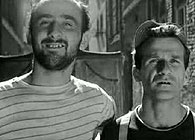|
|
|
|
Two Men and a Wardrobe
|
 |
|
Although
Roman Polanski made several notable shorts in his film-school days, Two Men and a Wardrobe is the one that
first gained him global attention.
Surrealistic
and absurdist, it can still serve as a good model for the short film form:
strictly visual (topped with a melancholic jazz score), perfectly
self-contained, with a well-shaped theme-and-variations structure.
Two
men emerge from the sea carrying a wardrobe. In their efforts to find a resting
place, they encounter only hostility, prejudice and violence. All hopeful
visions of innocence are quickly sullied or crushed.
Polanski,
already a dark social critic, shows us in sidelong glimpses, that such
dysfunction and animal regression are the daily norm for all people.
The
plight of the two men is clearly emblematic and allegorical, but Polanski
leaves its interpretation open: ‘It was the only film I’ve made that “meant”
something. It was about the intolerance of society toward somebody who is
different.’ (1) Accordingly, various commentators see in it a symbol for the
plight of the homeless, the racially outcast, gays or those persecuted for
their religious beliefs …
The
tale is cyclical and entropic, but is punctuated by lovely poetic moments –
plus a sense of knockabout, burlesque comedy that owes much to Chaplin and
silent cinema.
© Adrian Martin 2001 MORE Polanski: Chinatown, Cul-de-Sac, Death and the Maiden, The Fat and the Lean, The Fearless Vampire Killers, Frantic, The Ninth Gate, Repulsion, The Tenant, Tess, The Pianist, Knife in the Water, Rosemary’s Baby
|
![]()